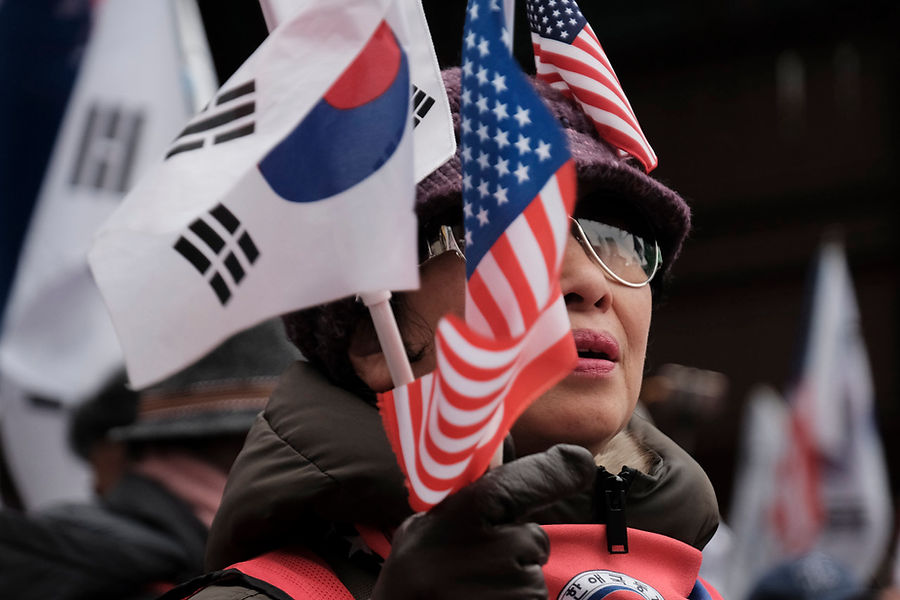How the North Korean threat is ultimately Seoul’s problem
Photographs by Eddie Gerald
Since the Korean War ended, Pyongyang has repeatedly shown its ability to strike neighbours and foreign interests in the region, often in response to what it sees as provocation. In 1994 South Koreans stocked up on essentials in panic after a threat by a North Korean negotiator to turn Seoul into "a sea of fire" - one which has been repeated several times since.
Given Pyongyang’s roll-out of missile tests and nuclear devices, and Trump’s “America First” rhetoric and inconsistency on foreign policy, there is a deep and even subconscious fear that things would go wrong and war could break any moment. This fear restricts South Koreans from expressing “too much” interest. It’s not just that Pyongyang’s threats have become so routine as to now be a bore. The problem is the South Korean indifference comes at a time of global uncertainty. Donald Trump is an inconsistent president; China’s role is still suspiciously ambiguous; Moon Jae-in, the South Korean president, is trying to dramatically reverse his conservative predecessor’s policies. Meanwhile, Kim Jong-un’s regime has tested more missiles in the past six years than his forefathers did in six decades.
North Korea will go to war when it feels threatened, according to a stark warning from security expert David Maxwell.Speaking on BBC Radio 4’s Analysis program, The associate director of the center for security studies at Georgetown University Col. Maxwell warned the outbreak of World War 3 could be started by a simple “miscalculation” from North Korea’s despot leader Kim Jong-un.

Korean child playing next to the statue of Sejong the Great King at Gwanghwamun Plaza with Bugaksan mountain in background in the city of Seoul capital of South Korea

Smoke billows from chimneys in an industrial area at the outskirts of the city of Seoul

Jae-cheon Lim a professor of North Korea studies at Korea university at his study room in the city of Seoul

Korean child playing next to the statue of Sejong the Great King at Gwanghwamun Plaza with Bugaksan mountain in background in the city of Seoul capital of South Korea
Col. Maxwell described how he foresees the outbreak of war on the Korean Peninsula, predicting 64,000 fatalities in the first day alone.
He said: “If I am a North Korea commander I would unleash the firepower of my artillery and inflict as much death and destruction on the South as I can.“ In the first hours, there will be hundreds of thousands of artillery rounds and rockets fired to the South, and many of them into Seoul.” the area including and surrounding the capital, where about half the country’s 51 million people are concentrated.
Shells would start raining on South Korea within minutes, according to Col. Maxwell, who also said no matter what safety preparations Seoul have made they will struggle to deal with a North Korean strike. He said: “Of course, many people won’t get the word, won’t believe it. Many people will be caught out in the open or caught in buildings that will end up being rubbled. “Projections of initial casualties, there would be 64,000 people killed on the first day.”
The expert also revealed the weapons could have chemical elements as North Korea looks to eliminate any South Korean defenders.
North Korea would then send troops across the border for a “man to man fight”. “It will be a man to man fight in those hills as North Korea tries to destroy the South Korea infantry. “North Korean soldiers have to destroy the South Korean military in those hills to allow their tanks and mechanised vehicles to pass.”
South Korea faces a triad of pressures - from its enemy in the north, its superpower ally across the Pacific, and its largest trading partner, China. However residents of South Korea who have friends abroad often share inside jokes about how outsiders are way more alarmed than everyone here, who would actually be wiped out if Kim Jong-un ever ordered a nuclear attack on this country.
In January 2018 I traveled to Seoul with renowned Israeli filmmaker Itai Anghel to conduct a documentary film for UVDA Israel's leading current affairs documentary program.
